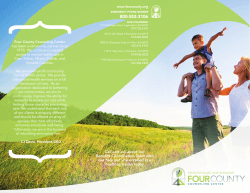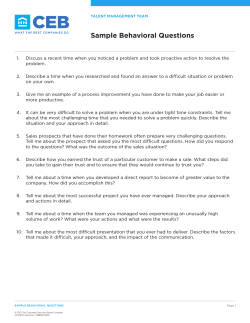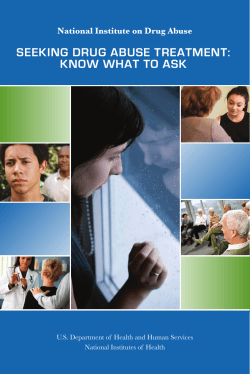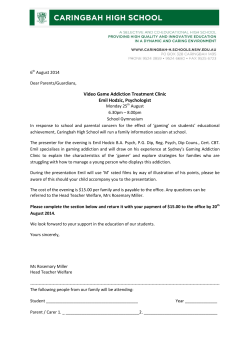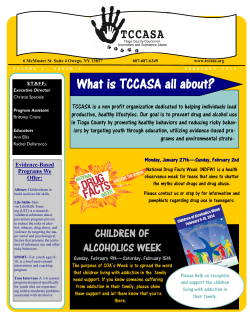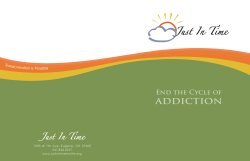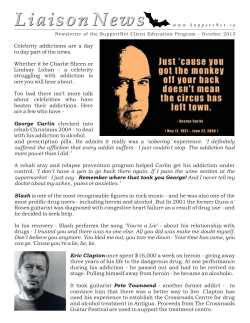
May 20, 2015 The Honorable Charles E. Grassley
May 20, 2015 The Honorable Charles E. Grassley Chairman, Committee on the Judiciary 224 Dirksen Senate Office Building Washington, DC 20515 The Honorable Robert Goodlatte Chairman, Committee on the Judiciary Rayburn House Office Building Washington, DC 20515 The Honorable Patrick Leahy Ranking Member, Committee on the Judiciary 152 Dirksen Senate Office Building Washington, DC 20515 The Honorable John Conyers Ranking Member, Committee on the Judiciary Rayburn House Office Building Washington, DC 20515 Dear Chairmen Grassley and Goodlatte, Ranking Members Leahy and Conyers: We write in support of the Comprehensive Addiction and Recovery Act of 2015, introduced by Senators Whitehouse, Portman, Ayotte, Klobuchar, Coons, and Kirk, and Congressmen Sensenbrenner and Scott, S. 524/H.R. 953, which will make important advancements to effectively address the growing epidemic of drug abuse in the United States. Heroin use and misuse of prescription painkillers is having a devastating effect on public health and safety in communities across the United States. According to the Centers for Disease Control and Prevention, drug overdoses now surpass automobile accidents as the leading cause of injury-related death for Americans between the ages of 25 and 64. 120 Americans die as a result of overdose in this country every day. We know that addiction is a treatable disease, but we also know that only about 10 percent of those who need treatment are receiving it. Discoveries in the science of addiction have led to advances in drug abuse treatment that can help people stop abusing drugs and resume their productive lives. We know from researchers, the law enforcement community, and treatment providers that the most effective way to address the challenges posed is to initiate a comprehensive response to the twin epidemics of opioid and heroin addiction that includes prevention, law enforcement strategies, preventing overdose deaths, expansion of evidence-based treatment, and support for those in, or seeking, recovery. The Comprehensive Addiction and Recovery Act of 2015 will: Expand prevention and educational efforts—particularly aimed at teens, parents and other caretakers, and aging populations—to prevent the abuse of opioids and heroin and to promote treatment and recovery. Expand the availability of naloxone to law enforcement agencies and other first responders to help in the reversal of overdoses to save lives. Expand resources to identify and treat incarcerated individuals suffering from addiction disorders promptly by collaborating with criminal justice stakeholders and by providing evidence-based treatment. 1 Expand disposal sites for unwanted prescription medications to keep them out of the hands of our children and adolescents. Launch an evidence-based opioid and heroin treatment and interventions program. While we have services and medications that can help treat addiction, there is a critical need to get the training and resources necessary to expand use of evidence-based treatment services and medications to assist in treatment and recovery throughout the country. Strengthen prescription drug monitoring programs to help states monitor and track prescription drug diversion and to help at-risk individuals access services. Only through a comprehensive approach, such as that included in the Comprehensive Addiction and Recovery Act of 2015, that leverages evidence-based law enforcement and health care services, including treatment, can we stop and reverse current trends. The goal is to implement these programs to test and demonstrate strategies without creating new programs and including the required offsets. The cost of the bill is kept low at approximately 65 million per year with no impact on mandatory spending. We are grateful for your leadership and urge all Members of Congress to support The Comprehensive Addiction and Recovery Act of 2015. Sincerely, 1. ACACIA NETWORK, Inc. 2. Alkermes, Inc. 3. American Academy of Addiction Psychiatry 4. American Association for Marriage and Family Therapy 5. American Association for the Treatment of Opioid Dependence 6. American Correctional Association 7. American Psychological Association 8. American Society of Addiction Medicine (ASAM) 9. Arizona Council of Human Service Providers 10. Association for Behavioral Health and Wellness 11. Association for Behavioral Healthcare of Massachusetts 12. Association of Recovery Schools 13. Association of Recovery in Higher Education 14. Association to Benefit Children 15. Behavioral Enhancement and Substance Abuse Medicine Treatment, B.E.S.T.PLLC – Dear Park, NY 16. Center for Behavioral Health Services 17. Central Florida Behavioral Health Network, Inc. 18. Clinical Social Work Association 19. The Coalition of Behavioral Health Agencies, Inc. 20. CODAC—Rhode Island 21. Colorado Behavioral Healthcare Council 22. Community Anti-Drug Coalitions of America 23. Community Behavioral Health Association of MD 24. Community Behavioral Healthcare Association of Illinois 25. Community Catalyst 2 26. Comprehensive Connections 27. DEA Educational Foundation 28. Division on Substance Abuse at the Department of Psychiatry, Columbia University College of Physicians and Surgeons 29. Employee Assistance Professionals Association – Long Island Chapter 30. Faces and Voices of Recovery 31. Family Services of Westchester 32. FedCURE 33. Michael Fine, Director of Public Health, Rhode Island 34. Florida Alcohol and Drug Abuse Association 35. Florida Council for Community Mental Health 36. Friends of Recovery New York 37. Georgia Association of Community Service Boards 38. Getting Out and Staying Out 39. Goodwill Industries of Greater New York and Northern New Jersey, Inc. 40. The Guidance Center of Westchester, Inc. 41. Hazelden Betty Ford Foundation 42. Hope Network 43. Horizon Health Services and Horizon Village, Inc. 44. Housing Works 45. International CURE 46. Joel K. Johnson, President and CEO, Human Resources Development Institute, Inc. 47. Kings Park in the kNOw Community Coalition – Kings Park, NY 48. Legal Action Center 49. The Long Island Center for Recovery – Hampton Bays, NY 50. Lutheran Social Services of Illinois 51. Major County Sheriffs Association 52. The Maine Association of Substance Abuse Services 53. The McShin Foundation 54. Mental Health America 55. Mental Health Association of Westchester County 56. Michigan CURE 57. Mike Matarazzo 58. Minnesota Recovery Connection 59. Missouri Recovery Network 60. NAADAC, the Association for Addiction Professionals 61. National Association for Children's Behavioral Health 62. National Association for Children of Alcoholics (NACoA) 63. National Association of County Behavioral Health & Developmental Disability Directors 64. National Association of State Alcohol and Substance Abuse Director 65. National Association of Addiction Treatment Providers 66. National Council for Behavioral Health 67. National Council on Alcoholism and Drug Dependence, Inc. (NCADD) 68. National Council on Alcoholism and Drug Dependence of New Jersey (NCADD-NJ) 69. National District Attorneys Association 70. NADAP 3 71. New York State Council for Community Behavioral Healthcare 72. New York Therapeutic Communities Inc. Stay’n Out Programs 73. North Shore Youth Council – Rocky Point, NY 74. Charles P. O’Brien, MD, Department of Psychiatry, University of Pennsylvania 75. The Ohio Council of Behavioral Health & Family Services Providers 76. Osborne Association 77. Partnership for Drug-Free Kids 78. Patricia Sams, Vice-President Stone County Alliance for Recovery 79. Pederson-Krag 80. Peninsula Counseling Center 81. Phoenix House 82. Raising Heroin Awareness 83. Samaritan Village 84. Senator Richard Sears, Vermont 85. Sky Light Center 86. Spanish Speaking Elderly Council – RAICES 87. Dr. Eric Strain, Behavioral Pharmacology Research Unit, Johns Hopkins University School of Medicine 88. StepUP Program, Augsburg College 89. TASC Illinois 90. Tennessee Association of Alcohol, Drug & other Addiction Services 91. Transitions Mental Health Services 92. Treatment Communities of America 93. The Treatment Research Institute 94. United We C.A.N. Change Addiction Now - National 95. Upper Manhattan Mental Health Center 96. Debra L. Wentz, Ph.D., CEO of New Jersey Association of Mental Health and Addiction Agencies, Inc. 97. WestCare Foundation 98. Yes Community Counseling - Levittown, NY 99. Young People in Recovery – National 100. Young People in Recovery – Albany, NY 101. Young People in Recovery – Austin, TX 102. Young People in Recovery – Madison, WI 4
© Copyright 2025
